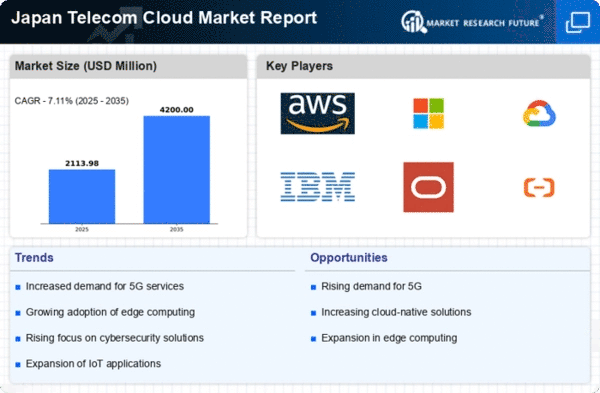Rising Demand for 5G Services
The telecom cloud market in Japan is experiencing a notable surge in demand for 5G services. As mobile operators expand their 5G networks, the need for cloud-based solutions to manage and optimize these services becomes increasingly critical. The integration of telecom cloud technologies enables operators to enhance network performance, reduce latency, and improve user experiences. According to recent data, the 5G subscriber base in Japan is projected to reach approximately 50 million by 2026, indicating a robust growth trajectory. This rising demand for high-speed connectivity is likely to drive investments in telecom cloud infrastructure, as companies seek to leverage cloud capabilities to support advanced applications such as IoT and smart cities. Consequently, the telecom cloud market is poised for significant growth as operators adapt to the evolving landscape of mobile communications.
Emergence of New Business Models
The telecom cloud market in Japan is evolving with the emergence of innovative business models that leverage cloud technologies. As telecom operators seek to diversify their revenue streams, many are exploring partnerships with technology firms to offer value-added services. This shift is leading to the development of new service offerings, such as cloud-based communication platforms and managed services. The potential for recurring revenue through subscription-based models is particularly appealing, as it allows operators to stabilize their income in a competitive market. Furthermore, the rise of over-the-top (OTT) services is prompting telecom companies to adapt their strategies and invest in cloud solutions that facilitate seamless integration with these platforms. Consequently, the telecom cloud market is likely to benefit from these evolving business models, driving growth and innovation in the sector.
Increased Focus on Data Analytics
The telecom cloud market in Japan is witnessing a growing emphasis on data analytics as companies seek to harness the power of big data. With the proliferation of connected devices and the generation of vast amounts of data, telecom operators are increasingly turning to cloud-based analytics solutions to derive actionable insights. This trend is particularly relevant in the context of customer experience management, where data analytics can help operators understand user behavior and preferences. According to industry reports, the market for data analytics in telecommunications is expected to grow at a CAGR of over 20% in the next few years. As telecom companies invest in cloud-based analytics tools, the telecom cloud market is likely to expand, enabling operators to optimize their services and enhance customer satisfaction.
Government Initiatives and Support
The Japanese government is actively promoting the digital transformation of various sectors, including telecommunications. Initiatives aimed at enhancing the country's digital infrastructure are likely to bolster the telecom cloud market. The government's focus on fostering innovation and encouraging the adoption of cloud technologies aligns with its broader economic strategy. For instance, the Ministry of Internal Affairs and Communications has outlined plans to improve broadband access and promote the use of cloud services across industries. This supportive regulatory environment may lead to increased investments in telecom cloud solutions, as businesses seek to comply with government directives and leverage available funding. As a result, the telecom cloud market is expected to benefit from these initiatives, driving growth and encouraging the development of new services and applications.
Shift Towards Digital Transformation
In Japan, businesses across various sectors are increasingly prioritizing digital transformation, which is significantly impacting the telecom cloud market. Companies are recognizing the need to modernize their IT infrastructure to remain competitive in a rapidly evolving digital landscape. This shift is prompting organizations to adopt cloud-based solutions that offer scalability, flexibility, and cost-efficiency. Recent surveys indicate that approximately 70% of Japanese enterprises are planning to increase their cloud investments in the coming years. This trend is likely to drive demand for telecom cloud services, as businesses seek to enhance operational efficiency and improve customer engagement through advanced technologies. The telecom cloud market is thus positioned to grow as organizations embrace digital transformation initiatives and leverage cloud capabilities to drive innovation.
















